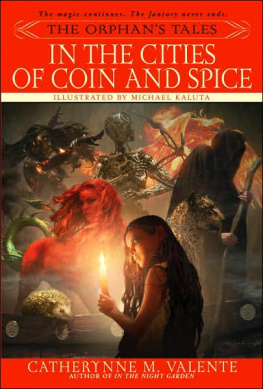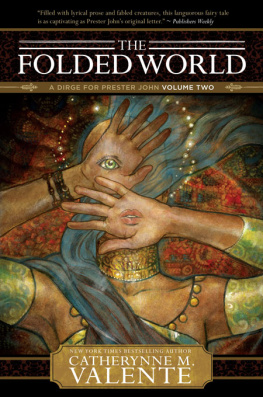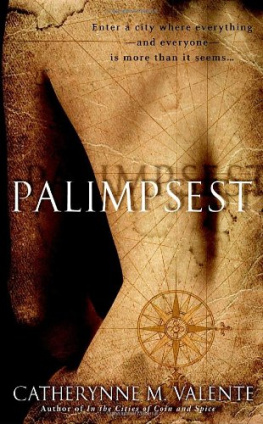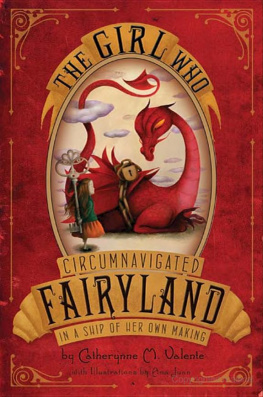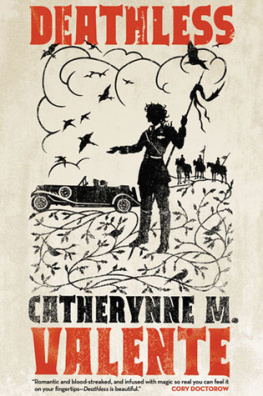T HE D RESSMAKERS T ALE , C ONTINUED
T HEY CAME BEFORE THE PEOPLE DID, SAID the Weaver-Star, indicating the silkworms in their cozy boxes, how far they must have come! Crawling on their weak, white bellies over tearing, chewing rocks! My darlings, my courtiers, who knew only that that which is woven longs for a weaver, and here lay one waiting.
The worms wriggled in ecstasy that their mistress deigned to speak of them, and the current of thread redoubled itself, singing through the bowls of dye and into her hands.
I have no more light, and no more blood, and my silk is rare and thin these days, but they make enough for anything I might wish to weave, and we are family, they and I. I am the Empress of the Alleys; they are silk dreaming of the Stars.
I thought I would burst for love of her, then, and her white eyes filled my vision. But if you wove all these wonders, how can you be content to weave a womans dress? A dress is nothing!
Xide looked at the woman on the dais, nearly dressed now, her waist swathed in crimson, crisscrossed with black ropes to match her beads, the skirt clinging to her legs and falling all the way to the floor. I do not understand you, friend Spider. How can you say a dress is nothing? Look at her. This thread begins in my silkworms and will end in the mouth of a Manticore, who will come to every window in the Woven City and sing until she is hoarse, and her voice will sound like a flute and a trumpet playing together, and at one particular window she will sing the saddest song she has ever sung, full of failure and sorrow and love thwarted, and searches which end in dust. It will be so terrible to hear that the whole city will weep. How can this be nothing? Tears in every flower bed, in every filthy sink! But this particular window will open and this woman will be wearing her crimson dress when she leans out, her smile so wide it would break your heart to see it. Her hair will hang down around her face, and also her beads, and when she calls out the name of the beast, a shower of pearls will fall from her mouth. The Manticore will break three stairs bounding up to her, and will bite her ever so gently on the shoulder when she knocks this woman to the floor in kittenish delight. They will grow very old together, these two: The muzzle of the one and the hair of the other will go quite gray. And when this womanthis woman, right here, whose dress you call nothing!dies, as die she must, the Manticore will sing over her breathless body in such mourning that the city will shudder and groan and remember its first weeping, and seven suicides will fling themselves from towers in unbroachable anguish in the wake of the lions dirge. And in grief, the Manticore will pull all her mistresss dresses from her armoire, and one by one she will tear them to pieces and eat them, for they will still smell of her, they will still taste of her, and the poor beast will not be able to bear to be apart from anything which recalls this woman whose dress was nothing.
Tears rolled down the face of the woman on the dais, her mouth hung open and she could not speak, her tears salting the dress, the beads, her breath ragged and hoarse. Yet through it she smiled, and clasped her bead-strung hands to her lips.
T HE T ALE OF THE W ASTE , C ONTINUED
T HE BLACK-VEILED WOMAN AND THE LEOPARD lay curled together on the cracked earth, listening. The spotted cat lashed her tail back and forth.
In the place where we come from, which is called Urim, no one may go clothed in anything other than the black robes and veils you see draped over my lady. We cannot, between us, imagine such a dress.
Nor could I, said Scald, her smoke calm and flowing slowly in a circuit that began at the crown of her head and flowed all the way around to the tip of her mere-tail. Djinn sometimes wear outlandish things, if they are Kings or Queens or Khaighas, but we can bank our flames into any sort of clothes we should desire, and more often than not this will outshine even the richest cloth. But I cannot see where the cloth of my body will end, and that would be a useful trick.
In Urim, we know each other only by our eyes, and every window is also curtained in black.
That would seem to me dreary and morose, the Djinn said.
It certainly seems so to usbut then, Urim is the Funereal City, and we cannot act against our character.
The Djinn said nothing, her eyes flashing flame. She put her black hands to the bars of the cage. Yet you are not dead, and you flee that black-slung place.
The cat smiled, in such a way as cats will smile. The tales of the dead are all the same. We are interested in yours, who live and burn.
Scald shook her head. You are very strange, Rend. And your mistress is stranger still.
So says a fire-fiend caged in iron she could surely melt anytime she wished, answered the leopard smoothly.
Quite so, the Djinn said chuckling.
T HE D RESSMAKERS T ALE , C ONTINUED
I CANNOT UNDERSTAND WHY SHE LET ME STAY . I am a spider and no more, yet she bade me sit beside her and tell her of the glass, and the poisoner, and the poor Sirens. She never ceased her weaving, but she laughed at the right parts, and caught her breath at the right parts, just as though she heard me and could have a care for the travails of spiders.
And she called me Sleeve. She meant for me to learn the value of dresses, she said. And so I did, and I listened to her tales of each garment: the green stocking for the Monopod who would tear his sock to emerald shreds on the thorns of the saltberry trees of the Antipodes, the black coat for the Ajan undertaker who would marry the day before he died, and be both wed and buried in this coat, the wispy white dress woven almost entirely of my own silk, my humble spiders silk, for the Dukes wife who would burn it all up into ash the day her child was born, the wings woven of horsehair and rose petals for the mask-makers son who wanted to see what Ajanabh looked like from abovethese he would hide from his father under the floor, hide them for so long they would turn to dust and brown petals beneath a green carpet. I listened to the stories as carefully as I studied the patterns, and in the company of a Star I learned all that it is right and proper for a spider to do.
In the church which was not a church, there were mice. This is not really surprising, as all churches are so plagued. Outside the radiant seat where Xide wove, and the rows of silkworm boxes, the place was terribly dusty and ill kept. Dust covered everything, turned it gray and dun and dullafter all, it is a rare celestial who will notice the state of the floor. Only I, who walked upon it, noticed. And in the corners where the mice lived, the dust was so thick and deep that if I was not careful I would sink into it like soft ash, and never be heard from again. The mice were much bigger, and walked through this fog of dust as though it were air, and saw little at all but the varying shades of dust, and became like roving drafts of dust themselves.
I spoke to them from time to time, for they were in awe of the Weaver-Star, and her worms, and her spider, and dared not approach herbut they longed to touch her, how they longed to touch her!
One was very large, his muscles trained on dust-wading. Deep in the summer evening he said to me, stroking his whiskers with gray paws:
She is so bright!
I suppose she is. Imagine what she looked like in the beginning, though! All that light!
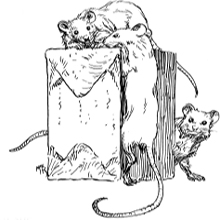
The mouse frowned. She is brighter than anything we know, he said.
She is no brighter than you or I. Her light is spooled out, thread by thread.
Next page
